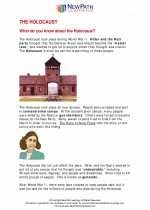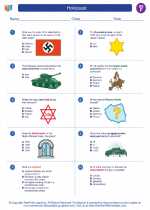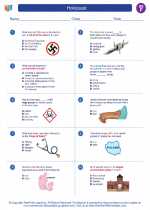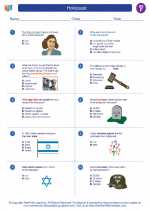Holocaust
The Holocaust took place during World War II. The Holocaust is what we call the mass killing of these people. Read More...
◂Social Studies Worksheets and Study Guides Sixth Grade. Holocaust
Study Guide Holocaust
Holocaust  Worksheet/Answer key
Worksheet/Answer key Holocaust
Holocaust  Worksheet/Answer key
Worksheet/Answer key Holocaust
Holocaust  Worksheet/Answer key
Worksheet/Answer key Holocaust
Holocaust 

 Worksheet/Answer key
Worksheet/Answer key
 Worksheet/Answer key
Worksheet/Answer key
 Worksheet/Answer key
Worksheet/Answer key

The resources above cover the following skills:
National Curriculum Standards for Social Studies (NCSS)
TIME, CONTINUITY, AND CHANGE
SOCIAL STUDIES PROGRAMS SHOULD INCLUDE EXPERIENCES THAT PROVIDE FOR THE STUDY OF THE PAST AND ITS LEGACY.
KNOWLEDGE - Learners will understand:
Concepts such as: chronology, causality, change, conflict, complexity, multiple perspectives, primary and secondary sources, and cause and effect.
The contributions of key persons, groups, and events from the past and their influence on the present.
PEOPLE, PLACES, AND ENVIRONMENTS
SOCIAL STUDIES PROGRAMS SHOULD INCLUDE EXPERIENCES THAT PROVIDE FOR THE STUDY OF PEOPLE, PLACES, AND ENVIRONMENTS.
KNOWLEDGE - Learners will understand:
Factors that contribute to cooperation and conflict among peoples of the nation and world, including language, religion, and political beliefs.
INDIVIDUALS, GROUPS, AND INSTITUTIONS
SOCIAL STUDIES PROGRAMS SHOULD INCLUDE EXPERIENCES THAT PROVIDE FOR THE STUDY OF INTERACTIONS AMONG INDIVIDUALS, GROUPS, AND INSTITUTIONS.
KNOWLEDGE - Learners will understand:
That when two or more groups with differing norms and beliefs interact, accommodation or conflict may result.
PROCESSES - Learners will be able to:
Analyze the effects of interactions between and among individuals, groups, and institutions.
Identify and analyze the impact of tensions between and among individuals, groups, and institutions.
POWER, AUTHORITY, AND GOVERNANCE
SOCIAL STUDIES PROGRAMS SHOULD INCLUDE EXPERIENCES THAT PROVIDE FOR THE STUDY OF HOW PEOPLE CREATE, INTERACT WITH, AND CHANGE STRUCTURES OF POWER, AUTHORITY, AND GOVERNANCE.
PROCESSES - Learners will be able to:
Analyze and evaluate conditions, actions, and motivations that contribute to conflict and cooperation among groups and nations.
Evaluate the role of technology as it contributes to conflict and cooperation among nations and groups, and as it contributes to or detracts from systems of power, authority, and governance.
GLOBAL CONNECTIONS
SOCIAL STUDIES PROGRAMS SHOULD INCLUDE EXPERIENCES THAT PROVIDE FOR THE STUDY OF GLOBAL CONNECTIONS AND INTERDEPENDENCE.
PROCESSES - Learners will be able to:
Analyze examples of conflict, cooperation, and interdependence among groups, com-munities, regions, societies, and nations.
Describe and explain the relationships and tensions between national sovereignty and global interests in such matters as territorial rights, natural resources, trade, the different uses of technology, and the welfare of people.
National Standards for Civics and Government (NSCG)
What are civic life, politics, and government? What are the essential characteristics of limited and unlimited government?
Limited and unlimited governments. Students should be able to describe the essential characteristics of limited and unlimited governments. To achieve this standard, students should be able to
Identify historical and contemporary examples of limited and unlimited governments and justify their classification, e.g.,
Unlimited governments--Nazi Germany, Imperial Japan, Spain under Franco, Argentina under Peron, Iraq under Hussein, Iran
What are civic life, politics, and government? What are the nature and purposes of constitutions?
Concepts of ''constitution.'' Students should be able to explain alternative uses of the term constitution'' and to distinguish between governments with a constitution and a constitutional government. To achieve this standard, students should be able to
Identify historical and contemporary nations with constitutions that in reality do not limit power, e.g., former Soviet Union, Nazi Germany, Iraq under Saddam Hussein
What are the foundations of the American political system? What values and principles are basic to American constitutional democracy?
Conflicts among values and principles in American political and social life. Students should be able to evaluate, take, and defend positions on issues in which fundamental values and principles are in conflict. To achieve this standard, students should be able to
Explain why people may agree on values or principles in the abstract but disagree when they are applied to specific issues
Agreement on the value of freedom of expression but disagreement about the extent to which expression of unpopular and offensive views should be tolerated, e.g., neo-Nazi demonstrations, racial slurs, profanity, lyrics that advocate violence
What is the relationship of the United States to other nations and to world affairs? How is the world organized politically?
Interaction among nation-states. Students should be able to explain how nation-states interact with each other. To achieve this standard, students should be able to
Describe the most important means nation-states use to interact with one another
Military force and the threat of force
Explain reasons for the breakdown of order among nation-states, e.g., conflicts about national interests, ethnicity, and religion; competition for resources and territory; absence of effective means to enforce international law
Explain the consequences of the breakdown of order among nation-states
National Center for History in Schools (NCHS)
Historical Thinking Standards
Historical Comprehension
Reconstruct the literal meaning of a historical passage.
Historical Analysis and Interpretation
Analyze cause-and-effect relationships and multiple causation, including the importance of the individual, the influence of ideas.
World History Content Standards
Era 8: A Half-Century of Crisis and Achievement, 1900-1945
The causes and global consequences of World War II.
The student understands the global scope, outcome, and human costs of the war.
Major global trends from 1900 to the end of World War II.
The student understands major global trends from 1900 to the end of World War II.